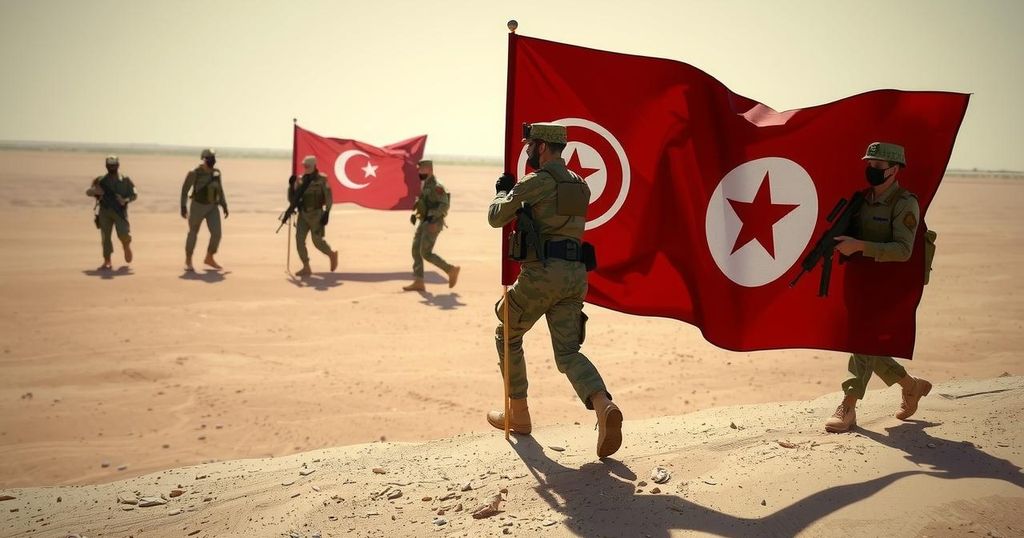Libyan Prime Minister Challenges Russian Military Expansion in Libya
Libyan Prime Minister Abdul Hamid Dabaiba is resisting Russia’s efforts to strengthen military bases in eastern Libya, expressing concerns about international conflicts spilling into the country. He has firmly rejected the notion of Libya becoming a battleground for major power rivalries. With ongoing issues of internal strife and U.S. economic pressure on Libyan officials, the situation remains tense as Russian military activity in the region increases.
Libya’s Prime Minister, Abdul Hamid Dabaiba, is openly opposing Russia’s recent efforts to bolster its military presence in eastern Libya following the collapse of the Assad regime in Syria. Dabaiba reiterated that Libya should not serve as a battleground for international rivalries, stating, “We have concerns about moving international conflicts to Libya, and that it will become a battlefield between countries.” Libya has been in turmoil since the 2011 NATO-supported rebellion that dethroned Muammar Gaddafi, leaving it divided between the UN-recognized government in Tripoli and a rival eastern administration supported by military leader Khalifa Haftar.
Reports indicate that Russian forces have been transferring military equipment from Syria to eastern Libya, where the rival administration has long received Russian aid. Dabaiba emphasized that his government will not permit the influx of Russian weapons, warning that such actions would exacerbate Libya’s ongoing crisis. He remarked, “No one with an ounce of patriotism wants a foreign power to impose its hegemony and authority on the country and the people.” Additionally, Dabaiba has engaged with the Russian ambassador to seek clarification on these developments.
Russia’s military installations in Syria have significantly boosted its influence across the Mediterranean and North Africa. Moscow has been negotiating with Syria’s new leadership to maintain these bases, but no agreements have been finalized. Analyst Jalel Harchaoui noted that Dabaiba’s public resistance to Russian moves represents a pivotal moment, undermining Russia’s perceived neutrality in Libya’s conflict. He suggested that Dabaiba’s stance may be a strategic maneuver to gain favor with the United States, which has intensified economic scrutiny of prominent Libyan political figures.
The United States has recently enacted stringent economic pressures on key players in Libya due to pervasive corruption. The new head of the Libyan Central Bank has disclosed that the Federal Reserve will suspend all dollar exchange transactions with the bank until an independent audit aimed at combating money laundering is initiated. This decision follows the Libyan National Oil Corporation’s acknowledgment of a significant income deficit, raising concerns about the financial dealings linked to oil smuggling and cooperation with Russia.
There are ongoing reports of Russian military aircraft making multiple flights to Libya, notably to the al-Khadim base near Benghazi, delivering advanced air defense systems such as the S-400 and S-300 equipment. Harchaoui observed that the changing dynamics in Syria could render Russia’s military advantages less secure, suggesting that Moscow is actively seeking to strengthen its foothold in Libya amidst growing complexities. Furthermore, Haftar’s forces continue to seek enhanced Russian military support to safeguard against past drone attacks that significantly weakened their operations.
The article examines the geopolitical tensions surrounding Libya as it navigates the ramifications of Russia’s attempts to enhance its military influence in the country. Following the ouster of Assad in Syria, concerns have arisen regarding the potential for Libya to be drawn into broader international conflicts. With years of internal strife post-Gaddafi era, the political landscape in Libya remains fraught, characterized by competing administrations and foreign interventions. The backdrop includes ongoing U.S. scrutiny of Libya’s economic dealings, particularly with the Central Bank and the Libyan National Oil Corporation, which adds another layer of complexity to Russia’s ambitions in the region.
In conclusion, Prime Minister Abdul Hamid Dabaiba’s resistance to Russian military reinforcements signifies a critical stance against the potential for Libya to become a pawn in larger geopolitical conflicts. With a backdrop of ongoing internal strife, the repercussions of foreign military interventions remain a significant concern. The evolving dynamics highlight the complexities of Libya’s political landscape and the international pressures shaping its future. As the U.S. continues to impose economic measures, the interplay between these political maneuvers will be pivotal in determining Libya’s trajectory in the coming months.
Original Source: www.theguardian.com




Post Comment